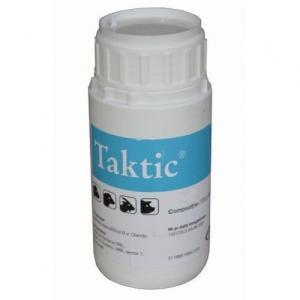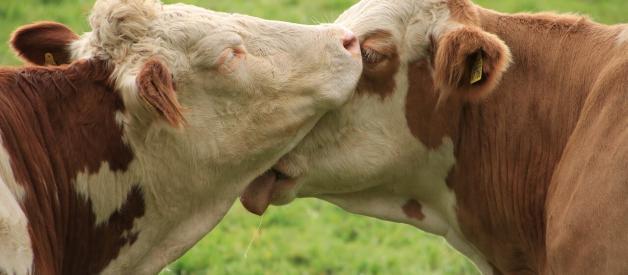Table of Contents
Taktic (Amitraz) solution 12.5% is a medication used to control and treat external parasites in farm animals. Amitraz is an acaricide that is effective against mites and ticks. It is commonly used to treat ticks, mange mites, and lice infestations in various farm animals such as cattle, sheep, goats, and pigs.

What Is Taktic (Amitraz solution)?
The solution typically contains 12.5% of the active ingredient amitraz, other inert ingredients, and solvents. It is available as a topical solution applied to the animal’s skin or diluted and used as a spray or dip. The instructions for using amitraz solution 12.5% can vary depending on the specific animal species being treated.
Ingredients
Each 50ml bottle contains:
- Amitraz 12,5%;
- Excipients.
What is the chemical formula for Amitraz?
The chemical formula for it is C19H23N3.
Forms of Amitraz
Amitraz for animals is available in different forms depending on the intended use and species being treated. The most common forms of medicine for animals include:
Liquid
What is liquid Amitraz?
Amitraz solution is available in liquid form, which can be applied topically or used for dilution to make sprays or dips. The liquid formulation allows for easy application and absorption by the animal’s skin.
Soap
Some formulations come in the form of medicated soaps. These soaps contain Amitraz as an active ingredient and are used for bathing animals to control external parasites. The soap helps in evenly distributing the medication over the animal’s body while providing a cleansing effect.
Spray
It can be formulated as a spray, which is convenient for treating larger animals or animals with extensive hair or fur coverage. The spray formulation allows for targeted application and even coverage over the animal’s coat, aiding in controlling external parasites.
Collar
It is also available as a collar for specific animal species. The collar is impregnated with the medication and is worn around the animal’s neck. It continuously releases the medication, providing long-term protection against ticks and other external parasites. Collars are commonly used for dogs but may also be available for other animals.
The availability of specific Amitraz formulations may vary depending on the country and manufacturer. Ask professionals how much Amitraz for dogs should be used.
Uses of Taktic
What is Amitraz used for?
Taktic for farm animals is typically used to control and treat external parasite infestations. Here are some common situations when it may be used for farm animals:
- Tick infestations: Taktic is effective against ticks, a common problem in farm animals. If your animals are infested with ticks, this medication can help control and eliminate the parasites.
- Mange mite infestations: Mange mites can cause skin problems and discomfort in farm animals. Taktic can treat mange mite infestations and help alleviate the associated symptoms.
- Lice infestations: Lice infestations can occur in farm animals, particularly during certain seasons. Taktic can be used to treat lice infestations and help eliminate these parasites.
It’s important to note that the specific timing and frequency of Taktic application may vary depending on the specific infestation, the severity of the problem, and the recommendations provided by the product label or a veterinarian.
Who Can Use Amitraz?
The use of the Taktic can vary depending on the specific formulation and concentration. Here’s a breakdown of the typical usage for different animals.
Amitraz for Farm Animals
Taktic is commonly used in farm animals such as cattle, sheep, goats, and pigs to control external parasites like ticks, mange mites, and lice.
Amitraz for Dogs
Amitraz is also used for dogs to treat and prevent ticks, mange mites and lice infestations. It is available in various forms, including amitraz soap for dogs, amitraz tick collar, amitraz bath for dogs, amitraz shampoo for dogs, and topical solutions, including spray. However, it is crucial to note that amitraz-based products designed for dogs should be used specifically for dogs and not for other animals unless directed by a veterinarian. Ask veterinarians how to use Amitraz dip concentrate liquid (solution) for dogs and about the side effects of Amitraz for dogs.
Amitraz for Hamsters
Amitraz is generally not recommended for use in small animals like hamsters. Hamsters are very sensitive to chemicals; using it or any other medication intended for larger animals or dogs can harm their health. If your hamster has a parasite infestation or health issue, it is best to consult a veterinarian specializing in small animals to determine the appropriate treatment options.t
It is not used for insects (Amitraz for bees) because of its chemical sensitivity.
In all cases, consult a veterinarian before using Taktic or any other medication to ensure it is safe and appropriate for the specific animal species, age, and health condition.
Dosage Sizes
How to use Amitraz 12.5?
Taktic can be applied as a spray or dip for treatment purposes. Combining Taktic with clean water on the treatment day is necessary for the spray form, adhering to the recommended proportions specified on the label. It is essential to treat both infested and non-infested animals simultaneously. In severe cases, a second treatment may be administered 7 to 10 days following the initial treatment.
The specific dosage sizes of the medicine for farm animals can vary depending on factors such as the species of animal being treated, the severity of the infestation, and the specific product guidelines. Here are some general recommendations:
- Cattle: The recommended dosage for cattle is typically around 0.2 to 0.5 ml of amitraz solution 12,5% per kilogram of body weight. The solution is usually applied topically or used as a spray.
- Sheep and Goats: The dosage may range from 0.3 to 0.4 ml of the solution per kilogram of body weight for sheep and goats.
- Pigs: The solution can be used in pigs to control external parasites. The dosage is typically around 0.2 to 0.3 ml per kilogram of body weight.
These dosage ranges are general guidelines, and the specific dosage requirements may differ depending on the specific recommendations provided by the veterinarian.

Important Safety Information for Owners
Is Amitraz harmful to animals?
When using Taktic for farm animals, owners must know the following safety information.
Carefully read and understand all instructions and precautions provided by the product label or veterinarian before using the medication. Follow the recommended dosage, application method, and treatment intervals specific to your animal species.
Wear gloves, protective clothing, and eye protection when handling the solution to prevent direct contact with the skin or eyes. Follow good hygiene practices, such as washing hands thoroughly after application.h
Do not consume or allow animals to ingest the solution. It is meant for external use only and can be toxic if swallowed.
Some individuals may be sensitive or allergic to Taktic. If you or your animals exhibit any signs of an allergic reaction, such as rash, itching, or difficulty breathing, discontinue use and seek immediate medical or veterinary attention.
Before using the medication, consult a veterinarian to ensure its suitability for your specific farm animal species, age, and health condition.
Remember, this is general safety information, and specific safety precautions and recommendations may vary depending on the product formulation, manufacturer guidelines, and local regulations.
Veterinary Prescription
Where to buy Amitraz?
The requirements for obtaining an amitraz solution for farm animals vary depending on the country and local regulations. In many cases, Taktic may be available over the counter without a veterinary prescription. However, regulations can change, and it is always best to consult local authorities or a veterinarian about where Amitraz can be found to determine the specific requirements in your area. And find Amitraz dip for sale.
Contraindications
Taktic should not be used in certain situations due to contraindications.
Animals with hypersensitivity or allergic reactions to Taktic or its components should not be treated with this medicine. Allergic reactions can include skin rash, itching, swelling, or difficulty breathing. If your animal has a known hypersensitivity or allergy to the medicine, alternative treatments should be considered.
Amitraz solution 12.5% is generally contraindicated for use in nursing animals, such as lactating cows or nursing sows. The active ingredient, Amitraz, may pass into the milk or be absorbed by the nursing young, posing a risk to their health. Consult a veterinarian for safe and suitable alternatives in such cases.
Use caution when using this medication on sick or debilitated animals. The active ingredient may have additional effects on their overall health.h
Extra care should be taken when using the solution on young animals, as they may be more sensitive to the medication. Dosage adjustments or alternative treatments may be necessary.
Side Effects
Taktic may cause certain side effects. Here are some potential side effects that can occur:
- Sedation and Lethargy: Medication can have a sedative effect on animals. After application, animals may appear tired, sedated, or lethargic for some time. This effect is usually temporary and resolves on its own.
- Gastrointestinal Disturbances: Some animals may experience gastrointestinal side effects, such as decreased appetite, vomiting, or diarrhea, after using amitraz solution. These symptoms are typically mild and transient.
- Skin Irritation: In rare cases, animals may develop localized skin irritation or redness at the application site. If excessive irritation occurs or if the symptoms worsen, discontinue use and consult a veterinarian.
- Hypersensitivity Reactions: Although uncommon, some animals may exhibit hypersensitivity reactions to the solution. These reactions can include skin rashes, itching, swelling, or difficulty breathing. If signs of hypersensitivity are observed, discontinue use and seek immediate veterinary attention.
- Neurological Effects: In rare instances, Taktic can affect the central nervous system, leading to symptoms such as tremors, uncoordinated movements, or changes in behavior. If any neurological signs are observed, discontinue use and consult a veterinarian immediately.
The occurrence and severity of side effects can vary depending on the individual animal, the dosage used, and other factors. If you notice any unexpected or concerning side effects, it is advisable to contact a veterinarian for further evaluation and guidance.
Overdose
An overdose of Taktic in farm animals can lead to more severe side effects and potential toxicity. It is crucial to adhere to the recommended dosage guidelines and consult a veterinarian to prevent an overdose. However, if an overdose occurs, the following symptoms may be observed:
- Severe Sedation: Excessive sedation or prolonged lethargy beyond the expected duration can occur in animals overdosed with Taktic. They may appear excessively drowsy or unresponsive.
- Respiratory Depression: Overdose of Taktic can result in respiratory depression, characterized by slowed or difficult breathing. This can be a severe condition that requires immediate veterinary attention.
- Hypotension: Taktic overdose can cause a drop in blood pressure, leading to hypotension. Animals may exhibit signs such as weakness, staggering, or collapse.
- Bradycardia: An overdose may also cause a significant decrease in heart rate, known as bradycardia. This can be detected by checking the pulse and observing the animal for signs of a slow heart rate.
If you suspect an overdose of Taktic solution in your farm animal, it is crucial to seek immediate veterinary assistance. Contact a veterinarian or an emergency veterinary clinic for guidance and inform them about the situation.
Remember, prevention is key. Always follow the recommended dosage instructions and consult a veterinarian for proper dosing guidelines to ensure the safe use of amitraz solution in farm animals.
Taktic Poisoning
Poisoning from the solution in farm animals can occur if they are exposed to excessive amounts of the product or if it is ingested accidentally. Poisoning is a serious condition that requires immediate veterinary attention. Here are some signs and symptoms of amitraz poisoning in farm animals:
- Animals may exhibit severe sedation, lethargy, and disorientation. They may appear weak, uncoordinated, or unresponsive.
- Poisoning can lead to respiratory depression, causing difficulty breathing, slow or shallow breathing, or gasping for breath.
- Poisoning with this medication can result in low blood pressure, leading to weakness, collapse, or shock-like symptoms.
- A slowed heart rate, known as bradycardia, can occur in cases of amitraz poisoning. The pulse may be weak or difficult to detect.
- Animals may experience nausea, vomiting, diarrhea, or excessive drooling due to Taktic poisoning.
If you suspect your farm animal has been poisoned by the solution, it is crucial to seek immediate veterinary assistance. Contact a veterinarian or an emergency veterinary clinic immediately and inform them about the situation. Follow the veterinarian’s guidance to stabilize and treat the animal with an antidote for amitraz poisoning in cattle and dogs.
Prompt action and professional veterinary care are vital in cases of poisoning to improve the animal’s chances of recovery and minimize potential complications.
Storage
Proper storage of Taktic for pets is essential to maintain its effectiveness and safety.
Store the medicine in a cool, dry place away from direct sunlight, extreme temperatures, and moisture.
Ensure the solution’s containers are tightly sealed to prevent evaporation, leakage, or accidental spills. This helps maintain the concentration and prevents contamination.
Keep Taktic in a secure area inaccessible to children, animals, or livestock. Store it in a locked cabinet or high shelf to prevent accidental ingestion or misuse. Store it away from areas where food, water, or animal feed is stored or prepared. This helps prevent cross-contamination and accidental consumption of the product.
Generic and Brand Names of Taktic (Amitraz)
Amitraz solution 12.5% for farm animals may be available under different generic and brand names, depending on the manufacturer and country. Here are a few examples:
Generic Name: Amitraz
Brand Names:
- Taktic
- Amitix
- Triatox
- Amitix-T
- Triazix
The medicine’s availability and specific brand names may vary in different regions.
Other Drugs in the Same Class
Is Amitraz an organophosphate?
It belongs to a class of drugs known as formamidines, which are used as ectoparasiticides. Here are some other drugs in the same class as Amitraz that are used for farm animals:
- Climbazole: Climbazole is a formamidine compound used in veterinary medicine to treat external parasites, particularly in cattle.
- Chlorfenapyr: Although not a formamidine, chlorfenapyr is another class of ectoparasiticide commonly used for farm animals. It is effective against ticks, mites, and other external parasites.
- Propoxur: Propoxur is a carbamate compound used as an ectoparasiticide for livestock and farm animals. It is effective against fleas, ticks, lice, and other external parasites.
- Dichlorvos: Dichlorvos, also known as organophosphate, is another class of ectoparasiticide used for farm animals. It is effective against external parasites, including ticks, mites, and flies.
These are just a few examples of drugs used in the same class as Amitraz for controlling external parasites in farm animals. These drugs’ availability and specific formulations may vary depending on the country and local regulations.
Comparing Amitraz to Other Active Ingredients:
Here’s a table comparing Amitraz’s benefits to other active ingredients:
|
Active Ingredient |
Class |
Mode of Action |
Targeted Parasites |
Formulations Available |
|
Amitraz |
Formamidine |
Alpha-2 adrenergic agonist |
Ticks, mites, lice |
Solution, spray, dip, collar |
|
Organophosphate |
Organophosphate |
Acetylcholinesterase inhibitor |
Various external parasites |
Various formulations |
|
Selegiline or Amitraz |
MAO-B inhibitor |
Dopamine metabolism modulation |
N/A |
Various formulations |
|
Amitraz vs Asuntol |
Crotamiton |
Ectoparasiticide |
Mites, ticks, fleas |
Lotion, spray, shampoo |
|
Amitraz vs Atipamezol |
Alpha-2 antagonist |
Reversal agent for sedatives and analgesics |
N/A |
Injectable solution |
|
Amitraz vs Cypermethrin |
Pyrethroid |
Sodium channel modulator |
Ticks, flies, lice |
Spray, pour-on, dip, collar |
|
Amitraz vs Deltamethrin |
Pyrethroid |
Sodium channel modulator |
Ticks, flies, lice |
Spray, pour-on, dip, collar |
|
Amitraz vs Garrapatas |
Amitraz-based |
Amitraz-based formulation |
Ticks |
Solution, spray, dip, collar |
|
Flumethrin vs Amitraz |
Pyrethroid |
Sodium channel modulator |
Ticks, flies |
Collar, spot-on |
|
Sulfurated lime or amitraz |
Sulfur compound |
Parasiticide and antifungal |
Mites, lice, ticks |
Dust, spray, shampoo |
Please note that the table provides a general overview and may not include all available formulations or specific uses of each active ingredient. It is always recommended to consult a veterinarian or refer to product labels for detailed information and specific usage instructions for each active ingredient.
FAQ
Does Amitraz kill fleas and ticks?
Yes, Amitraz is effective in killing fleas and ticks. It belongs to the formamidine class of drugs and acts as an alpha-2 adrenergic agonist, disrupting the nervous system of these parasites.
Does Amitraz solution expire?
Yes, it has an expiration date. Check the product label for the specific expiration date and use the solution before that date. Expired solutions may have reduced effectiveness or stability.
How do I apply Amitraz solution to farm animals?
The application method can vary depending on the specific formulation and the instructions provided by the manufacturer. Generally, Amitraz solution can be applied as a spray, dip, or using a collar. Follow the directions on the product label carefully and consult with a veterinarian for specific guidance.
How does Amitraz work?
Amitraz works by stimulating alpha-2 adrenergic receptors in the nervous system of parasites, such as fleas and ticks. This stimulation disrupts their normal nerve function, leading to paralysis and, ultimately, their death.
How to wash off pesticides?
To wash off pesticides, follow these general steps:
- Remove contaminated clothing and wash them separately.
- Rinse skin thoroughly with water to remove any visible pesticide residues.
- Use mild soap and water to gently wash the affected area, paying attention to any exposed skin.
- Rinse the area thoroughly with clean water.
- Pat dry with a clean towel.
- If necessary, seek medical advice or contact a poison control center for further guidance.
Please note that specific instructions may vary depending on the pesticide type and exposure severity.

































